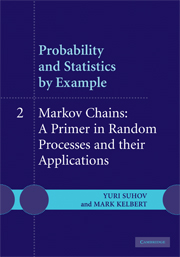Epilogue: Andrei Markov and his Time
Published online by Cambridge University Press: 11 November 2010
Summary
The topic of Markov chains occupies a special place in teaching probability theory. It is named after the Russian mathematician who introduced and developed this elegant concept in the 1900s, 30 years before the notion of probability was shaped in the manner we use it today.
Andrei Andreevich Markov (1856–1922) was born into the family of a Russian civil servant. His father, following the family tradition, began his career by studying at a local seminary, but then moved into a forestry inspection office and later became a private solicitor. Markov's father was well known for his frankness and high principles, qualities inherited by his son, but was also inclined to gamble at card games. Once he lost all the family's possessions, but luckily his opponent was unmasked as a cheat, and the loss was declared void. His son by contrast loved chess and was considered one of the best amateur players of the time. When Mikhail Chigorin, a Russian chess master, was preparing for his 1892 match for the World Chess Championship with the Austrian Wilhelm Steinitz, the reigning World champion, he played a sparring series of four games with Markov; Markov won one and drew another. (Chigorin was later dramatically defeated in the decisive game by Steinitz, to the deep disappointment of numerous chess enthusiasts in Russia who still deplore this loss).
- Type
- Chapter
- Information
- Probability and Statistics by Example , pp. 479 - 482Publisher: Cambridge University PressPrint publication year: 2008



